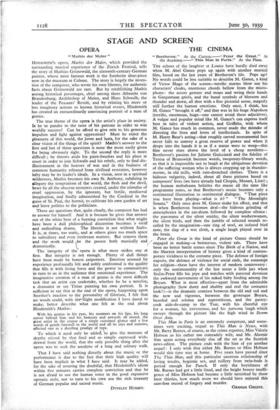" Beethoven." At the Curzon.—" Peter the Great." At the
Academy.—" This Man in Paris." At the Plaza.
THE echoes of the laughter at Louise have hardly died away when M. Abel Gance pops up again with another musical film, based on the last years of Beethoven's life. Pops up? No words could be less suitable to describe M. Gance, a kind of Victor Hugo of the screen—terrific storms blow out his characters' cloaks, enormous chords bellow from the micro-
phone : the actors gesture and moan and wring their hands in Gargantuan griefs, and the banal symbols of blossom and thunder and dawn, all shot with a fine pictorial sense, magnify
still further the human emotions. Only once, I think, has M. Gance " brought it off," and that was in his huge Napoleon
(terrific, enormous, huge—one cannot avoid these adjectives).
A vulgar and popular mind like M. Gance's can express itself best in tales of violent action, and Griffiths, with whom M. Gance has much in common, never made the mistake of directing the lives and loves of intellectuals. In spite of M. Harry Baur's acting—that roughly carved monumental face never fails to convey a great reserve of power and when it
drops into the hands it is as if a statue were to weep—this film never rises above the level of a cheap novelette—
Beethoven's passion for Juliette Guicciardi and the fidelity of Teresa of Brunswick become words, twopenny-library words, so that it is impossible not to laugh at the ubiquitous devotion of the suffering woman who is always cropping up in thunder- storms, in old mills, with rain-drenched clothes. There is a hideous vulgarity, indeed, about all these pictures based on composers' lives (we have already had Chopin, Mozart, Liszt) ; the human melodrama belittles the music all the time like programme notes, so that Beethoven's music becomes only a sentimental illustration to sentimental dialogue. " That piece you have been playing—what is it? " " The Moonlight Sonata." Only once does M. Gance make his effect, and that is when Beethoven becomes deaf—the hideous grinding of atmospherics in the ear-drum followed by complete silence: the panorama of the silent smithy, the silent washerwomen, the silent birds, and then the jumble of selected sounds re- called by the imagination—one ring of steel, an isolated bird note, the slap of a wet cloth, a single laugh played over in the brain.
Peter the Great is the kind of picture Gance should be engaged in making—a boisterous, violent tale. There have been no better battle scenes since The Birth of a Nation, and the Marxist interpretation of history gives a kind of contem- porary vividness to the costume piece. The defence of foreign experts, the defence of violence for social ends, the contempt for religion—these have the interest of modern controversy:
only the sentimentality of the last scene a little jars when Stalin-Peter fills his pipe and watches with paternal devotion the awkward movements of his naked baby feeding among the Boyars. What is most effective—apart from the admirable photography (how dusty and shabby and real the costumes look!)—is the dramatic contrast between the old and sad and the new and vigorous, between the grotesque Boyars, bearded and solemn and superstitious, and the pastry-
cook aide-de-camp to the Tsar, with his cheerful eye for a woman, his irreverence, and his parvenu laugh which sweeps through the picture like the high wind in Storm Over Asia.
This Man in Paris is an extremely competent, and some- times very exciting, sequel to This Man is News, with
Mr. Barry Barnes, of course, as the crime reporter, Miss Valerie Hobson as his rather too comradely wife, and Mr. Alastair Sim again acting everybody else off the set as the Scottish news-editor. The picture ends with the hint of yet another sequel: I only wish that either Mr. Barnes or Miss Hobson would this time stay at home. Five years have passed since
The Thin Man, and this particular uxorious relationship of loving insults, hygienic sex, and raillery from twin-beds is period enough for Punch. If only the boyishness of Mr. Barnes had got a little lined, and the bright breezy intelli- gence of Miss Hobson had become a little tarnished by these later thirties, how much more we should have enjoyed this care-free record of forgery and murder.
GRAHAM GREENE.










































 Previous page
Previous page